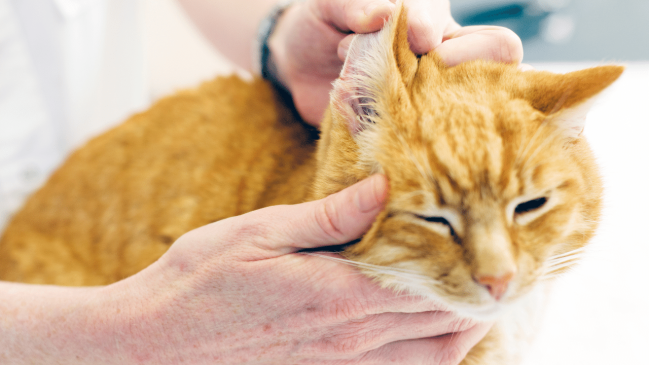It's a scary thought: your cat going deaf. It can happen slowly — not responding to loud noises or not darting into the room when you open their food. Of course, cats who are deaf or become deaf can still live great and happy lives. Cats have an extraordinary ability to adapt and make do with their circumstances. Whether your cat was born deaf or goes deaf over time and into old age, your cat won’t be inhibited during its daily activities, but you might need to adjust how you interact with your feline friend and how you care for them.
But since not all cats respond to verbal cues, it may be hard to spot the signs of a cat that’s going deaf. To make sure you’re caring for your deaf cat in the best way possible, Pawp reached out to Dr. Laura Pletz, DVM and scientific services manager at Royal Canin, to get the rundown.
Signs your cat is going deaf
Becoming startled easily
Meowing/communicating more loudly
Ignoring noises they previously found scary
Disorientation
Heightened sense of smell or sight
Pus or discharge coming from the ears
You may be used to your cat being lethargic or even ignoring you all together, but one telltale sign that your cat could be going deaf is that it doesn’t respond at all to loud noises, like the doorbell or even something falling in your home.
Dr. Pletz recommends “clapping your hands or eliciting a sound from one of their toys while facing away from you.” If you notice your cat frequently ignores loud sounds, bring it into the vet, who can assess for sure what’s going on with your feline friend.
What causes cat deafness?
Congenital defect
Cats who are born deaf might have had a congenital defect, says Dr. Pletz. If your cat has a congenital defect, it just means it was an issue that was present at birth. "In most cases of congenital deafness, the cats affected will have an all-white or mostly white coat." In this case, deafness is most often inherited.
Old age
Similar to humans, cats may lose hearing with age. Aging is the primary cause for going deaf in cats who were not born that way.
Chronic conditions
Chronic conditions like blocked ear canals or ear infections can also cause deafness. Other conditions like infections or cancer/tumors may also affect your cat's hearing.
Trauma to the ear
Sometimes acute trauma to the ear can cause deafness in cats. The trauma may prevent sound waves from reaching the nerves in your cat's ears.

How to diagnose a deaf cat
While you'll need to seek a vet for an official diagnosis, there are certain things you can do at home that will allow you to gauge whether your cat is deaf or going deaf. You can perform a test where you make a loud noise (like clapping) out of sight, but near your cat to determine if they become startled or pay attention to the noise.
Depending on the cause of your cat's diminishing hearing, a vet will need to perform different tests. Most commonly, they will examine the ear canal; in some cases your cat may need an MRI.
How to care for a deaf cat
Use visual cues and vibrations
According to Dr. Pletz, "it is likely that deaf cats will be very attuned to their other senses." She suggests "using visual cues or vibrations to get their attention or treats to entice them are great ways to interact with them."
If you’re used to calling your cat to get their attention, this may be the biggest change you have to make. Using visual cues to alert your cat to meal time, etc. can be helpful for your cat to adjust and understand what's going on.
Purchase special items that can help
If your cat seems agitated by acquired deafness or startled by other animals in the home that the cat doesn't hear coming, a calming collar could be a great investment. Calming collars work by mimicking your cat's natural pheromones so they feels like they're constantly in a comforting, familiar environment. Leaning in to your cat's other senses, such as vision can help too. Try alerting your cat that it's dinner time, etc. by pulling out a specific toy in their eye line when you want your cat to do something.
Keep your house safe
Dr. Pletz reassures that there aren’t many safety concerns for deaf cats, especially a cat that is domestic. However, she notes that "keeping a consistent routine for play and feeding is always comforting” and may help the cat get used to their new lifestyle.
Provide extra comfort to your pet
Deaf cats may not be safe on their own to wander outside, since they can't hear car honks or other loud noises that might threaten them. Keeping your cat indoors and getting them on a routine will be a huge comfort to the cat. If your cat is deaf, whether they were born that way or became deaf, you as an owner have an added responsibility to look out for potential dangers your cat might miss.
Announce yourself as much as possible
Try to announce yourself as much as possible, either by vibrating the floor boards or presenting visual cues as soon as possible, so you don’t frequently startle your cat and cause unnecessary stress to your pet.
